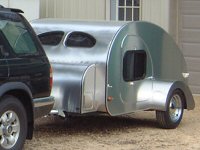Without AC: To Insulate or Not?
17 posts
• Page 1 of 2 • 1, 2
Without AC: To Insulate or Not?
If you were going to be living in your trailer, in a hot climate, without a 120 volt air conditioner, would you rather have the trailer insulated or uninsulated? If insulated, I am thinking about 2 3/4 inches of polyiso insulation in the walls and ceiling, yielding an insulation value of about R15, and with the roof painted with Henry’s 587.
1. With Insulation. I am wondering if, with insulation, maybe the trailer would heat up during the day, equal to the outside ambient temperature of, say 95F, with the insulation absorbing and holding that heat at 95F. Once the trailer was heated to 95F, the insulation would then hold that heat until well after bedtime and maybe also would prevent the trailer from cooling down much during the night.
2. Without Insulation. On the other hand, without insulation, maybe the trailer would cool off quickly and equalize to the ambient nighttime temperature. 12 volt fans would be used to cool the inside of the trailer at night.
I currently own a 800 sq ft. house out in the country, with no shade trees, without air conditioning. However, the house is insulated (probably about R18 in the gabled attic and R12 in the stud walls). In the summertime, when it is 95F outside during the daytime, the inside of the windows are covered with blinds to block sunlight. At night, I open all the windows, run a few 120 volt ceiling fans, and the house cools down to about 74F by 6am, when the outside temperature is about 66F. Then, first thing in the morning, I close all the windows. The inside of the house will slowly increase in temperature to about 80F by 8pm.
As an aside, even though the outside temperature starts falling at about 6pm, the temperature inside the house will continue to rise until about 8pm. The house usually equalizes to the outside temperature of, say 80F, by about 10pm.
So, it takes my house about 14 hours during the daytime (from 6am to 8pm) to gain 6 degrees but only 8 hours during the night (from 10pm to 6am) to fall 6 degrees. It would appear that the house cools down almost twice as fast as it heats up.
I would appreciate it if you guys would share your thoughts with me.
Thank you,
Ron
1. With Insulation. I am wondering if, with insulation, maybe the trailer would heat up during the day, equal to the outside ambient temperature of, say 95F, with the insulation absorbing and holding that heat at 95F. Once the trailer was heated to 95F, the insulation would then hold that heat until well after bedtime and maybe also would prevent the trailer from cooling down much during the night.
2. Without Insulation. On the other hand, without insulation, maybe the trailer would cool off quickly and equalize to the ambient nighttime temperature. 12 volt fans would be used to cool the inside of the trailer at night.
I currently own a 800 sq ft. house out in the country, with no shade trees, without air conditioning. However, the house is insulated (probably about R18 in the gabled attic and R12 in the stud walls). In the summertime, when it is 95F outside during the daytime, the inside of the windows are covered with blinds to block sunlight. At night, I open all the windows, run a few 120 volt ceiling fans, and the house cools down to about 74F by 6am, when the outside temperature is about 66F. Then, first thing in the morning, I close all the windows. The inside of the house will slowly increase in temperature to about 80F by 8pm.
As an aside, even though the outside temperature starts falling at about 6pm, the temperature inside the house will continue to rise until about 8pm. The house usually equalizes to the outside temperature of, say 80F, by about 10pm.
So, it takes my house about 14 hours during the daytime (from 6am to 8pm) to gain 6 degrees but only 8 hours during the night (from 10pm to 6am) to fall 6 degrees. It would appear that the house cools down almost twice as fast as it heats up.
I would appreciate it if you guys would share your thoughts with me.
Thank you,
Ron
- featherliteCT1
- 1000 Club

- Posts: 1167
- Joined: Wed Dec 28, 2016 6:54 am
- Location: Southern Indiana
Re: Without AC: To Insulate or Not?
Insulation helps deaden noises too. For that reason many insulate. If your thinking a cargo trailer, they can be noisy.
Sent from my iPhone using Tapatalk
Sent from my iPhone using Tapatalk
- Padilen
- Donating Member
- Posts: 1536
- Joined: Fri Jan 30, 2015 4:20 pm



